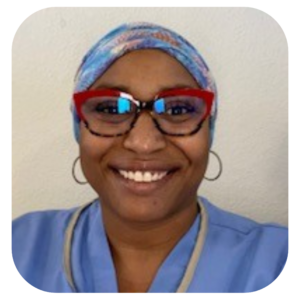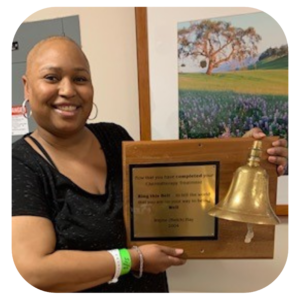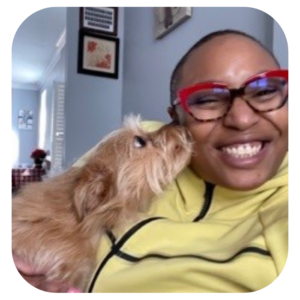July 21, 2023
Empathy through experience: How being a patient impacted her practice
 Tamara Washington is someone you’d easily welcome at your bedside, should you find yourself a patient at Texas Health Cleburne in Cleburne, Texas. Equal parts soothing, engaging, and disarming, she’s as observant as she is feeling when it comes to her patients: there’s what’s happening in the moment — the symptoms, the condition calling for treatment — and what’s underlying: the reeling, the unknowing, and uncertainty.
Tamara Washington is someone you’d easily welcome at your bedside, should you find yourself a patient at Texas Health Cleburne in Cleburne, Texas. Equal parts soothing, engaging, and disarming, she’s as observant as she is feeling when it comes to her patients: there’s what’s happening in the moment — the symptoms, the condition calling for treatment — and what’s underlying: the reeling, the unknowing, and uncertainty.
Washington, a nurse practitioner with Sound’s hospital medicine team, originally set out to become a school superintendent but found the path to get there daunting. She switched her major to nursing, not realizing it, too, would be challenging. Still, she kept at it — both enjoying and excelling in her education — eventually becoming a nurse practitioner in 2012. After stints in hospital medicine, retail medicine, and locums work, Washington returned to her first love — being a hospitalist — and accepted a job with Texas Cleburne Health in April 2019. By that October, she was facing down a stage 3 adrenal cancer diagnosis — and the reeling, unknowing, and uncertainty that came with it.
It’s a rare cancer, with between 300 and 500 people a year diagnosed. Initially, she didn’t want treatment.
“It seemed so doom and gloom,” she said. “I didn’t think I had it in me.”
Then 36, her doctors said she was too young not to try. And she didn’t want to let down her family. Washington’s dad passed away when she was in high school, and her mother fell into addiction. She went to live with her uncle when she was 15 and he was 27. Eventually, he married, and she considers them as much mom and dad as aunt and uncle. 
“I just thought, this will hurt too many people,” said Washington, who has seven siblings and four step-siblings. “I didn’t want that many people to be sad about me.”
Washington had surgery to remove her adrenal gland followed by four months of intense chemotherapy that left her body and spirit ravaged. She lost her hair and 100 pounds. She was severely immunocompromised and often struggled to make the drive from Houston to Cleburne after treatments, so debilitating was the nausea and head-spinning. In the midst of her treatment, the coronavirus pandemic exploded. And Washington kept working through it all.
“It was traumatic,” she said, noting that when she was too weak or sick for her shift, her colleagues would step up. As a cancer patient, she said the focus was largely on getting the cancer out of her — and helping her get back to her life. What was missing was tenderness in the moment — an acknowledgment not just of the physical hardship but the emotional heft of the situation.
Washington will tell you that cancer is the hardest thing she’s had to go through in her life. Even as she went through so much loss and grief as a child, lost her boss during the pandemic, and said goodbye to her ex-husband and dear friend who lost his battle with cancer in September of 2022.
“That silent fear never goes away,” she said.
As someone who sees people at their most vulnerable, her experience as a patient shows up in how she connects with hers at the bedside.
“Whether they’re getting better or not getting better, I want everyone to be comfortable and have what they need,” she said.
So, when a 42-year-old woman going through chemotherapy for breast cancer was admitted, Washington really felt it.
“She had that look I recognize — of defeat, of sorrow,” she said.
Washington understood. She checked in frequently on the woman, who had no visitors. She brought her a pack of Honest Kids juice boxes — the only thing that tasted good to her while she was going through her own rounds of chemo.
When her patient told her she wasn’t sure she could keep going, Washington shared that she’d had cancer, gone through treatment — that it was the hardest thing she’d ever done. She gave her “Stronger Together” bracelet — one she’d picked up at the cancer center gift shop after a follow-up visit — to her patient as a gesture of faith.
“I hope on the days she feels like it’s impossible, it gives her just a little bit more strength,” she said. “Everyone gets the same care from me, but for cancer patients, I have a soft spot.”
 Washington, who went through a second surgery in 2021 when her cancer returned, this time in her liver, is sharply attuned to the people around her, and how OK — or not OK — they are. She calls it quiet trauma — what we’re carrying with us in the wake of the pandemic, our collective and individual grief and loss. Given all she’s been through, as a patient and practitioner, she, too, is pushed to her emotional limits.
Washington, who went through a second surgery in 2021 when her cancer returned, this time in her liver, is sharply attuned to the people around her, and how OK — or not OK — they are. She calls it quiet trauma — what we’re carrying with us in the wake of the pandemic, our collective and individual grief and loss. Given all she’s been through, as a patient and practitioner, she, too, is pushed to her emotional limits.

“Even if I’m overwhelmed, I sometimes have to stop and take a minute, and remind myself — there was a time when you prayed and wished you could be back working,” she said.
And then she gets to it.
“I don’t take anything for granted anymore,” she said. “What I went through — that’s a lot of science and medicine, but also a lot of faith.”
